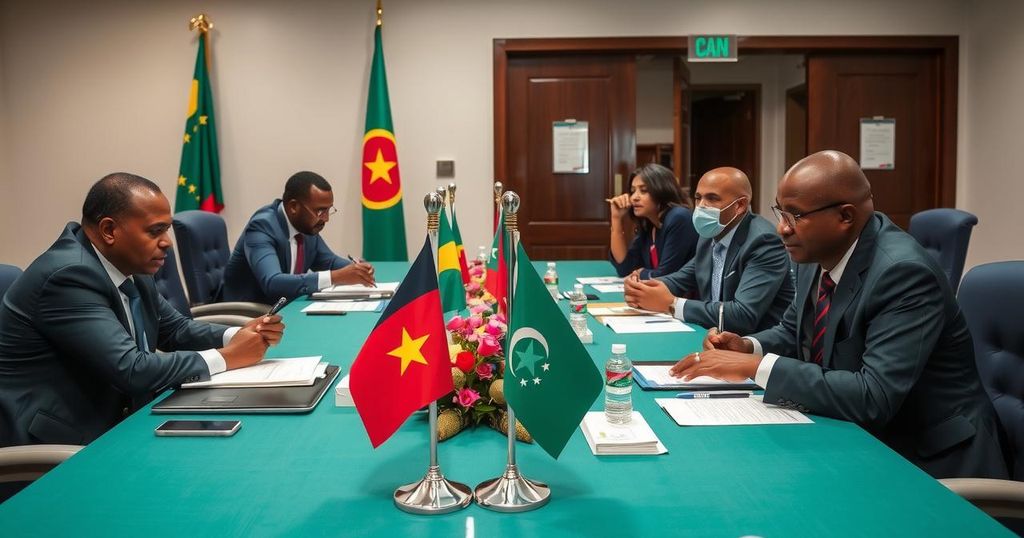Somalia’s Foreign Affairs Minister Ali Omar led a delegation to Addis Ababa to reinforce the Ankara Agreement signed in December 2017. This visit aims to strengthen bilateral ties and mutual commitments focused on peace and cooperation. The agreement allows Ethiopia access to maritime routes through Somalia, essential for its economic development. Increased international interest, including support from France, highlights the potential for regional stability and collaboration as both nations work towards a shared future.
A delegation led by Somalia’s Minister of Foreign Affairs and International Cooperation, Ali Omar, visited Addis Ababa on December 14, 2017, to reaffirm the commitments established in the Ankara Agreement. The Somalia Ministry of Foreign Affairs stated that this visit reaffirms Somalia’s dedication to bolstering bilateral relations with Ethiopia, as discussed during prior diplomatic engagements in Ankara, facilitated by Turkish President Recep Tayyip Erdoğan.
The Ankara Agreement represents a significant milestone, having been signed on December 2, 2017, by Ethiopian Prime Minister Abiy Ahmed and Somali President Hassan Sheikh Mohamud. It is designed to enhance peace and cooperation in the Horn of Africa. President Erdoğan remarked on its historic nature, expressing hopes for improved regional stability.
This agreement includes provisions that permit Ethiopia to secure a safe and sustainable maritime passage through Somalia’s sovereign territory, a critical requirement for a landlocked nation seeking to diversify its trade. Prime Minister Abiy emphasized that Ethiopia’s aspirations are rooted in peaceful endeavors, benefiting neighboring nations as well: “Ethiopia’s desire to have a sea passage is a peaceful endeavor that benefits our neighbors as well.”
The delegation’s visit aligns with ongoing efforts to strengthen cooperation between Ethiopia and Somalia, with Somalia’s Ministry emphasizing principles of sovereignty and mutual respect. The Ankara Agreement reflects a shared commitment to overcome historical tensions, focusing on constructive dialogue and mutual benefit.
Key elements of the Ankara Agreement include mutual respect for sovereignty, recognition of Ethiopian efforts under the African Union, and the establishment of technical negotiations expected to commence in February. Turkey’s role as a mediator in any disputes has also been accepted by both nations.
International interest in the Horn of Africa’s stability continues to grow, as evidenced by recent comments from French President Emmanuel Macron supporting Ethiopia’s maritime aspirations through dialogue and adherence to international law. The successful implementation of the Ankara Agreement could set a precedent for resolving conflicts in the region, enhancing economic cooperation, and fostering a durable peace in both nations. As Ethiopia and Somalia progress, their mutual commitment to dialogue is poised to yield greater regional cohesion and prosperity.
The context of this article revolves around the diplomatic relations between Somalia and Ethiopia, particularly framed by the Ankara Agreement signed in December 2017. This agreement marked a significant shift in the dynamics within the Horn of Africa, focusing on collaboration to address historical grievances. The importance of establishing reliable maritime access for Ethiopia, a landlocked nation, underscores the economic and strategic dimensions of this agreement.
In summary, the visit by Somalia’s delegation to Addis Ababa underscores a renewed commitment to the Ankara Agreement among Ethiopia and Somalia. By focusing on sovereignty, mutual respect, and cooperative dialogue, both nations are taking significant steps toward fostering peace and regional stability. The international community’s involvement reflects the broader implications of their collaboration, indicating a possible framework for conflict resolution and economic development in the Horn of Africa.
Original Source: addisinsight.net






